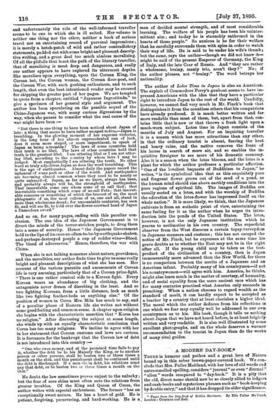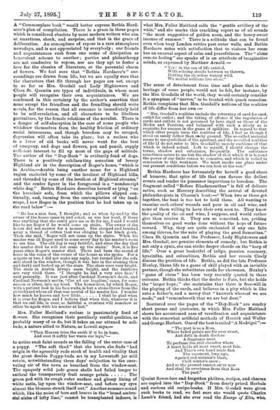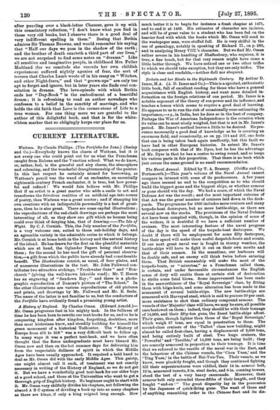A MODERN DAY-BOOK.*
THERE is humour and pathos and a great love of Nature bound up in this sober brown-paper-covered book. We con- clude that Mrs. Fuller Maitland, with her love of old words and untrammelled spelling, considers " journal " or even " diurnal " " alien " words compared to " day-book." It is a pity that the old, direct name should now be so closely allied to ledgers and cash-books and mysterious phrases such as " book-keeping by double entry," and that it has dropped its older significance.
• Pages from the Day-Book of Bethia Hardaere. By Ella Fuller Mallard. patient, forgiving, persevering, and hard-working. He is a. London : Chapman and Hell. A "Commonplace book" would better express Bethia Hard- acre's plan of compilation. There is a grace in these pages which is considered obsolete by most modern writers who aim at smartness, shock, and surprise, and that is the grace of
deliberation. An atmosphere of repose is a rare atmosphere nowadays, and is not appreciated by everybody; our friends and acquaintances rush from one scene of dissipation or benevolent scheme to another ; parties and philanthropy are not conducive to repose, nor are they apt to foster a love for the classics of literature, or the perennial charm of flowers. We feel sure that "Bethia Hardacre's " sur-
roundings are drawn from life, but we are equally sure that the characters that flit through her pages are not, except
in so far as Mrs. Goodall and Lady Hightowere and Clara St. Quentin are types of individuals, in whom most people will recognise their own acquaintances. We are confirmed in this certainty by the author's assertion that none except the friendless and the foundling should write novels, for the reason that all romance is immediately held to be self-revelation, and all characters to be libellons portraiture, by the female relations of the novelist. There is a danger of self-absorption in the case of some people who withdraw themselves from the healthy friction of ordinary social intercourse, and though boredom may be escaped, depression will often take its place; but a recluse who is a lover of old books will never want for the best of company, and dogs and flowers, pen and pencil, supply sufficient interest to fill up most of the gaps of solitude.
Tue author of the " Day-Book " is evidently fond of dogs. There is a positively exhilarating sensation of breezy Highland air in the description of Roger's home, "which is in Arabia,—Arabia being another name for a Highland
region encircled by some of the loveliest of Highland hills, and threaded by some of the loveliest of Highland streams," and the centre figure in the foreground is a "nondescript white dog." Bethia Hardacre describes herself as lying "on the horsehair sofa, from which the pillows slipped con- - tinually, and, turning from the contemplation of the land- scape, I saw Roger in the position that he had taken up in the road below" :—
" He has a nice face, I thought; and so when by-and-by the owner of the house came in and asked, as was her wont, if there was anything that she could give me or do for me, I said I would like to see Roger if he would come up stairs. The owner of the house did not answer for a moment. She stooped and brushed away a thread of cotton that was clinging to her black gown. Then she said, Roger will not come up the stairs. When his master was ill Roger used to come every day to his master's room to see him. The old dog is very faithful, and since the day that his master died he will not come up the stairs.' Now, it is five years since Roger's master died. There had been the sound of tears in the voice of the owner of the house as she spoke. For a minute or two I did not make any reply, but turned (for the sofa still stood in the window, though it was late in the evening then and dark) and looked up at the stars. The stars were very bright. The stars in Arabia always seem bright, and the rainbows are very vivid there. 'I thought he had a very nice face,' I said presently. It was just after Cardinal Newman's death, and Cardinal Newman's motto, Cor ad cor loquitur,' came, for some reason or other, into my head. The house-door, by which Roger, with a patient look in his face waits, is but a stone-throw from the churchyard where all that was mortal of his master lies. I wonder
how much he knows and how little I shall be glad when it is over for Roger, and I believe that when this, whatever it is that we call life, is over, so faithful a creature will somehow or other be again with his master at last."
Mrs. Fuller Maitland's recluse is passionately fond of flowers. She recognises their peculiarly restful qualities, as probably many of us do, but it takes an ear attuned to soli- tude, a nature allied to Nature, as Lowell says,— " Then Heaven tries the earth if it be in tune, And over it softly her warm ear lays,"—
to notice such faint sounds as the falling of the outer case of a poppy. " The soft thud" that she hears, she finds " had origin in the agreeably rude stock of health and vitality that the great double Puppy-buds set in my Lowestoft jar still retain, notwithstanding three days' subjection to the ener- vating air of the town as breathed from the window-seat. The opaquely solid jade green shells had failed longer to enthral the transparently frail orange petals The green pod with its rough outer surface and glossy lining of white satin, lay upon the window-seat, and before my eyes almost the blossom struck itself out." Another summer-sound which, like the noise of bees and breeze in the " broad ambro- sial aisles of lofty lime," cannot be transplanted indoors, is what Mrs. Faller Maitland calls the " gentle artillery of the whin," and she marks this crackling report as of all sounds "the most suggestive of golden noon, and the honey-sweet incense of summer." There is a solitude that can be found even when busy London rattles past outer walls, and Bethia Hardacre notes with satisfaction that to visitors her room
has an unusual aspect of calm and peacefulness. The " alone remote feeling" she speaks of is an attribute of imaginative minds, as expressed by Matthew Arnold;— "Yes ! in the sea of life enisled, With echoing straits between us thrown,
Dotting the shoreless watery wild, We mortal millions live alone."
The sense of detachment from time and plane that is the heritage of some people, would not be felt, for instance, by the Mrs. Goodalls of the world, they would certainly consider it a symptom of "nerves," to be treated with quack remedies. Bethia complains that Mrs. Goodall's notions of the realities of life differ from her own :—
" Mrs. Goodall's realities include the returning of card for card, cutlet for cutlet; and the taking of offence if the regulation of cards and cutlets is not governed by laws rigid as those of the Medea and Persians, and balanced with such a nicety as is requisite for success in the game of epilikins. In regard to that which other people term the realities of life, I feel as though I stood on sandy rather than rocky ground. The so-called material seems to me symbolical of the spiritual, and the so-called realities of life (I do not refer to Mrs. Goodall's) merely emblems of that which is indeed actual. Left to myself, I should change the terms, shadow and substance, frequently. The substance sometimes seems to me but the shadow of that which it is beyond the power of our finite senses to conceive, and which is veiled in concession to this weakness. We must smoke our glass under our present conditions before we can look at the sun.'
Bethia Hardacre has fortunately for herself a good share of humour, that spice of life that can flavour the dullest events and render its possessor impervious to boredom. The fragment called "Before Rhadamanthua " is fall of delicate satire, such as Mercury describing the arrival of devoted philanthropists in Charon's boat:—" When two or three get together, the boat is too hot to hold them. All wanting to examine each others' wounds and pour in oil and wine, and none of them willing to have their own seen to. They know the quality of the oil and wine, I suppose, and would rather give than receive it. They are so conceited, too, priding themselves on good works done without the hope of fntare reward. Why, they are quite enchanted if any one falls among thieves, for the sake of playing the good Samaritan."
Clara St. Quentin and the Professor, Lady Hightowers and Mrs. Goodall, are genuine elements of comedy; but Bethia is not only a cynic, she can strike deeper chords on the " harp of life." Over a great basketful of tulips, pansies, rosemary, hyacinths, and columbines, Bethia and her cousin Cicely
discuss the problem of life. Bethia, as did the late Professor Huxley, likens life to a game of skill played with an invisible partner, though she substitutes cards for chessmen. Huxley's " game of chess " has been very recently quoted in these
columns. Bethia thinks that the dealer is Fate, but she holds the "larger hope;" she maintains that there is free-will in the playing of the cards, and believes in a pity which is like unto a father's, and a mercy that " knoweth whereof we are made," and "remembereth that we are but dust."
Scattered over the pages of the "Day-Book" are sundry short poems and quatrains, in which Mrs. Fuller Maitland shows her accustomed ease of versification and acquaintance with the somewhat artificial methods of Herrick and Waller and George Herbert. One of the beet is called "A Madrigal
" The past is as a Rose, Whose faded petals are for ever sweet, And doth in death disclose A fragrance meet To perfume the still chamber where A heart holds all most sweet, most fair.
And Time's own hand made fast The casement, long ago, Against sad autumn's blast, Chill winter's snow;.
And so the present cannot en'er now And steal its sweetness from that Rose The past."
Quaint flower-lore and forgotten philtres,- recipes, and charms are copied into the " Day-Book " from dearly-prized Herbals and curious old recipe-books: If Mrs. Goodall were given such books to read, we feel sure she would quote Charles Lamb's friend, had she ever read the Essays of Elia, who,
after puzzling over a black-letter Chaucer, gave it up with this consolatory reflection, "I don't know what you find in these very old books, but I observe there is a good deal of very indifferent spelling in them." Seeing that Bethia admires Sir Thomas Browne, and would remember his saying that " Half our days we pass in the shadow of the earth ; and the brother of death exacteth a third part of our lives," we are not surprised to find some notes on "dreams." Like all sensitive and imaginative people, in childhood Mrs. Fuller Maitland (for we conclude she records her own childish experiences) suffered nightly agonies of fear, the sort of terrors that Charles Lamb wrote of in his essay on " Witches, and other Night-fears," and that " grown-ups" are only too apt to forget and ignore, but in later years she finds real con- solation in dreams. The love-episode with which Bethia ends her " Day-Book " is the embodiment of a beautiful dream ; it is refreshing to read an author nowadays who confesses to a belief in the sanctity of marriage, and who holds the old faith that Love is the corner-stone of Life to a true woman. For one thing more we are grateful to the author of this delightful book, and that is for the white- ribbon marker that so obligingly keeps our place for us.




































 Previous page
Previous page